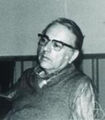Template:Selected anniversaries/October 5: Difference between revisions
No edit summary |
No edit summary |
||
| Line 11: | Line 11: | ||
||1777 – Johann Andreas Segner, Slovak-German mathematician, physicist, and physician (b. 1704) | ||1777 – Johann Andreas Segner, Slovak-German mathematician, physicist, and physician (b. 1704) | ||
||1781 – Bernard Bolzano, Czech mathematician and philosopher (d. 1848) - Bernard Bolzano (/bɒlˈtsɑːnoʊ/; German: [bɔlˈtsaːno]; born Bernardus Placidus Johann Nepomuk Bolzano; 5 October 1781 | ||1781 – Bernard Bolzano, Czech mathematician and philosopher (d. 1848) - Bernard Bolzano (/bɒlˈtsɑːnoʊ/; German: [bɔlˈtsaːno]; born Bernardus Placidus Johann Nepomuk Bolzano; 5 October 1781) was a Bohemian mathematician, logician, philosopher, theologian and Catholic priest of Italian extraction, also known for his antimilitarist views. | ||
||1869 – During construction, the Hennepin Island tunnel has a limestone cap breached and the rushing water breaks large chunks of land away and the St. Anthony Falls are nearly destroyed. | ||1869 – During construction, the Hennepin Island tunnel has a limestone cap breached and the rushing water breaks large chunks of land away and the St. Anthony Falls are nearly destroyed. | ||
||William Lassell, FRS FRSE FRSL FRAS (d. 5 October 1880) was an English merchant and astronomer.[1][2][3][4][5 | ||William Lassell, FRS FRSE FRSL FRAS (d. 5 October 1880) was an English merchant and astronomer.[1][2][3][4][5] He is remembered for his improvements to the reflecting telescope and his ensuing discoveries of four planetary satellites. | ||
||1882 – Robert H. Goddard, American physicist, engineer, and academic (d. 1945) | ||1882 – Robert H. Goddard, American physicist, engineer, and academic (d. 1945) | ||
||Dirk Coster (October 5, 1889), was a Dutch physicist. | |||
||1899 – Elda Anderson, American physicist and health researcher (d. 1961) | ||1899 – Elda Anderson, American physicist and health researcher (d. 1961) | ||
Revision as of 21:12, 12 December 2017
1607: Assassins sent by Pope Paul V attempt to kill Venetian statesman and scientist Paolo Sarpi, who survives fifteen stiletto thrusts.
1713: Philosopher, art critic, and writer Denis Diderot born. He will be a prominent figure during the Enlightenment, serving as co-founder, chief editor, and contributor to the Encyclopédie along with Jean le Rond d'Alembert.
1910: Mathematician Nathan Jacobson born. He will conduct research on the structure theory of rings without finiteness conditions--a subject closely related to the theory of algebras--which will transform the approach to classical results and break ground for solutions to problems inaccessible by previous methods.
1975: Six Seconds to Hell is "a reasonably accurate depiction of events as I experienced them," says art critic and alleged supervillain The Eel.
1976: Viking program: The Viking 2 orbiter primary mission ends at the beginning of solar conjunction. The extended mission will commence on 14 December 1976 after solar conjunction.
1985: Mathematician Karl Menger dies. He worked on mathematics of algebras, algebra of geometries, curve and dimension theory, game theory, and social sciences.
1985: Writer and crime-fighter Isaac Asimov publishes Two Plus Two Opens the Door, an introduction to Gnomon algorithm functions for children, which will influence a generation of mathematicians.
1985: Mathematician and statistician Harald Cramér dies. He helped found probability theory as a branch of mathematics, writing in 1926: "The probability concept should be introduced by a purely mathematical definition, from which its fundamental properties and the classical theorems are deduced by purely mathematical operations."
2017: Dennis Paulson of Mars celebrates the forty-first anniversary of the end of the Viking 2 orbiter's primary mission, at the beginning of the solar conjunction.








